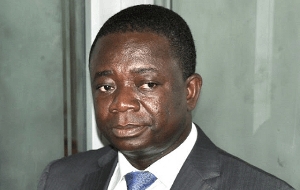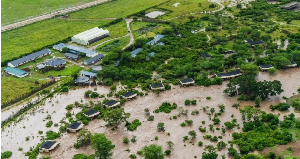- Home - News
- TWI News | TV
- Polls
- Year In Review
- News Archive
- Crime & Punishment
- Politics
- Regional
- Editorial
- Health
- Ghanaians Abroad
- Tabloid
- Africa
- Religion
- Election 2020
- Coronavirus
- News Videos | TV
- Photo Archives
- News Headlines
- Press Release
Business News of Sunday, 27 December 2009
Source: Agence France-Presse
Oil Expected to Pump Up Ghana's Economy in 2010
Accra, Ghana. Ghana’s stock exchange was the best performing market in the world in 2008 but has suffered this year in the global economic crisis. Now, an oil boom is putting the west African nation back on track.
After rising 58.1 percent in 2008, the Ghana Stock Exchange has fallen 47.9 percent this year as foreign investors shunned assets considered risky while local investors sought refuge in short-term securities.
Market observers say the bourse will bounce back in the year ahead as Ghana prepares to pump out oil for the first time, with interest rate cuts, a strong local currency, the cedi, and falling inflation boosting confidence.
“We are expecting GSE All-Share index to climb to about 35 percent as commercial oil production will commence in the last quarter of next year,” said Edem Dewortor, a stock analyst with Ecobank Development.
The GSE-All Share index gained 2 percent from Monday to Thursday last week before closing for the Christmas break.
“The outlook for the Ghanaian bourse next year is very bright as the local currency is holding against the major international currencies and inflation is on the decline,” said Collins Appiah, an analyst at Gold Coast Securities.
Appiah said part of the reason for the recent decline of the stock market was that it was overpriced in 2008 and had to adjust in 2009, commenting: “It is natural that the market reacts to this by correcting itself.”
The global financial meltdown has impacted negatively on Ghana’s stocks as well as bringing down financial markets across Africa, dealers said.
The crisis affected the bottom-line of many Ghanaian companies, including those listed on the stock exchange, hitting the economy as a whole. Inflation in Ghana has been high in recent months, reducing the funds available to potential investors.
Inflation is now on the decline, however, reaching 16.9 percent year-on-year in November, the fifth consecutive monthly fall, sparking expectations of further interest rate cuts.
The figure is a significant drop from October’s 18 percent rate but still leaves inflation above the government’s target of 14.5 percent by the end of the year.
Ghana, which is gearing up for oil production late next year, has tightened fiscal policy in a bid to tame inflation stuck at around 20 percent for most of 2009.
The country has been on the world energy map since 2007 when oil was discovered at the offshore Jubilee field, believed to hold some 1.8 billion barrels.
Ghana is already the world’s second-biggest cocoa exporter after neighboring Ivory Coast and Africa’s No. 2 gold producer.
The government forecasts the economy will grow by up to 10 percent in 2010 compared with 6 percent this year.
Oil revenue in particular is expected to help Ghana recover from an economic crisis that has driven the cedi currency down 15 percent against the dollar in the six months through July.
The depreciation boosted the cost of imported goods, lifting consumer price inflation to a five-year peak of 20.7 percent.
A source at the stock exchange said that strong economic factors, as well as new listings, would boost stocks in the new year.
“We expect a strong and steady recovery on the stock market next year. Volume and turnover are expected to improve further.”











